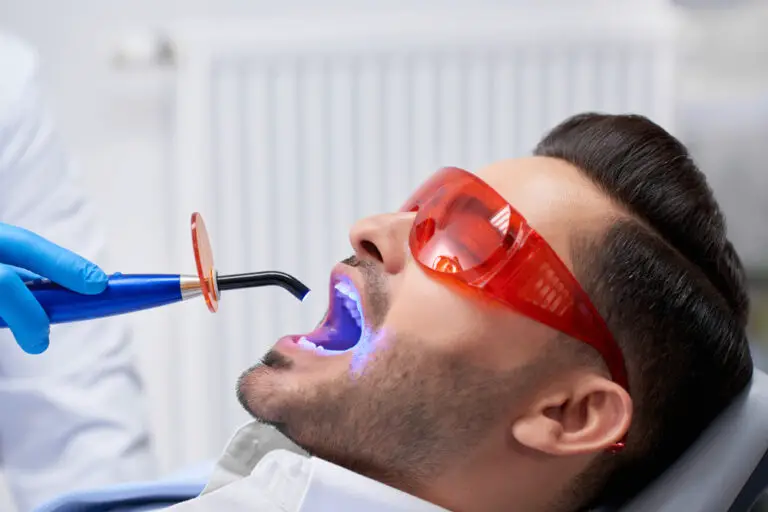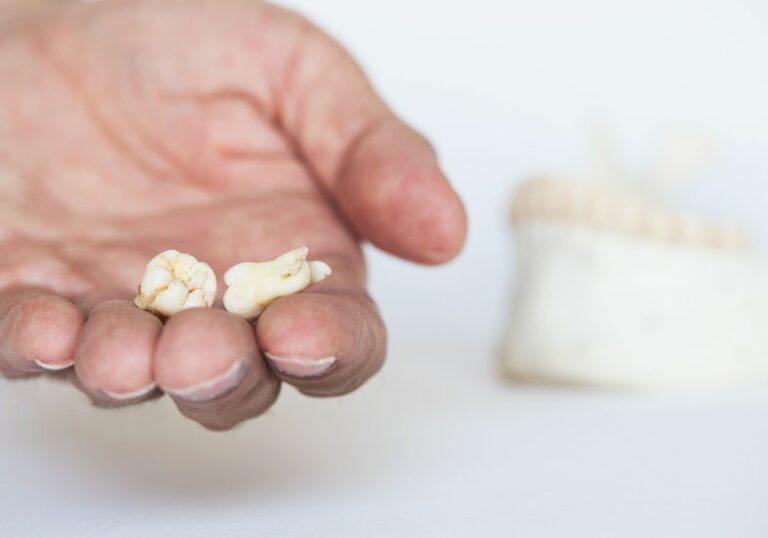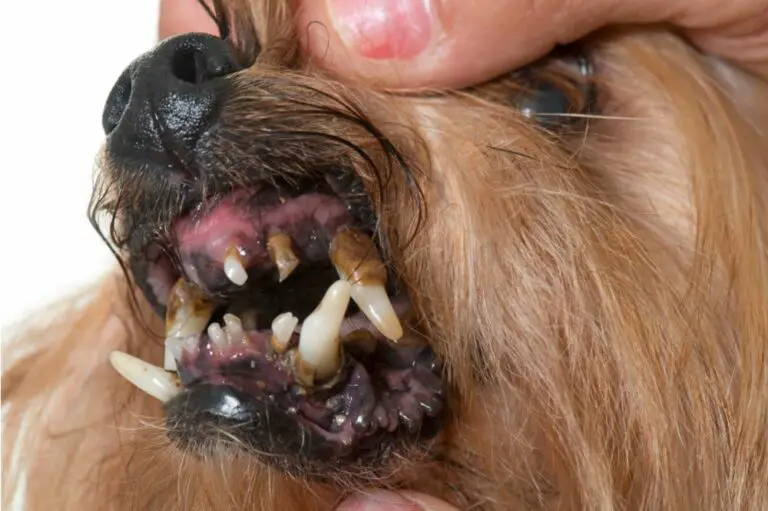Bleeding after wisdom tooth extraction is very common and to be expected. However, excessive bleeding that doesn’t seem to stop can be cause for concern. In this article, we’ll discuss the reasons wisdom teeth cause bleeding, when the blood loss is considered excessive, and what you can do to stop wisdom tooth bleeding.
What causes wisdom teeth to bleed?
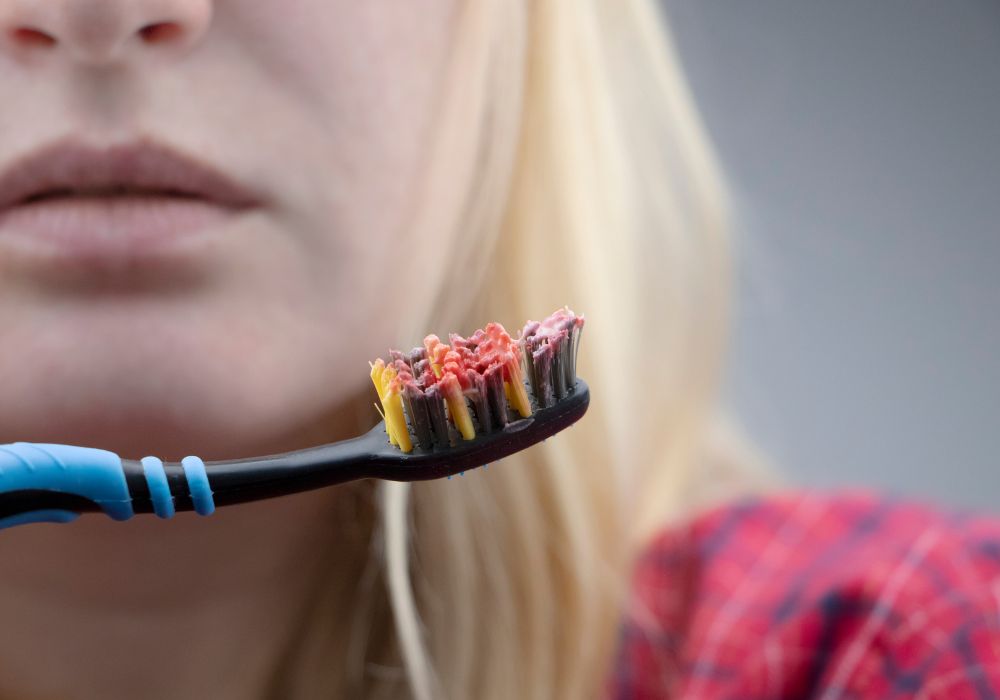
Wisdom teeth, or third molars, are the last teeth to erupt in the very back of your mouth. They typically emerge sometime between ages 17 to 25. However, many people have their wisdom teeth removed due to lack of space in the jaw, misalignment, or tendency for impaction.
During wisdom tooth extraction, the oral surgeon has to cut through the gums and bone tissue to access and remove the tooth. This surgical procedure leaves behind an open wound that will bleed as the mouth heals. Here are some key reasons you may experience wisdom tooth bleeding:
- Damage to blood vessels: The surgeon has to manipulate tissue and bone to extract the tooth, which can damage capillaries and blood vessels. This causes bleeding in the surgical site.
- Oozing from extraction socket: After a wisdom tooth is pulled out, it leaves behind an empty tooth socket in the bone which will fill up with blood from the injured capillaries. This blood will slowly ooze out while clotting.
- Medications or bleeding disorders: Medications like blood thinners or anti-inflammatories can increase bleeding. Underlying disorders like hemophilia can also lead to excessive bleeding.
What’s considered excessive wisdom tooth bleeding?
It’s normal to see some blood-tinged saliva and mild oozing after a wisdom tooth extraction. However, you should watch for these signs of excessive bleeding:
- Bleeding that lasts longer than 24 hours after having your wisdom teeth pulled
- Constant heavy bleeding that seems to replenish itself right after you wipe it away
- Soaking more than 2-3 gauze pads or tea bags within 30 minutes
- Passing large red blood clots
- Feeling signs of anemia like fatigue, dizziness, and shortness of breath
| Level of Bleeding | Description | Warning Sign? |
|---|---|---|
| Pink saliva | Trace amounts of blood mixed in saliva | No |
| Mild oozing | Slight bleeding from extraction socket that stops with pressure | No |
| Soaking 3+ gauze pads in 30 min | Heavier blood flow that continues after applying pressure | Yes |
| Passing large blood clots | Clots the size of a coin coming from socket | Yes |
| Bleeding >24 hours | Blood flow not slowing down a day after surgery | Yes |
If you notice any of these warning signs of excessive wisdom tooth bleeding, you should contact your oral surgeon right away or seek emergency care.
What causes prolonged wisdom tooth bleeding after extraction?
Some potential causes of wisdom tooth bleeding that won’t stop include:
- Dislodged blood clot: The initial blood clot that forms at the surgery site gets dislodged or dissolved. This exposes the wound and causes continued bleeding. Activities like vigorous rinsing, smoking, drinking with a straw, or spitting can dislodge the clot.
- Infection: Bacteria entering the wound can lead to an infection called dry socket. This causes severe pain and delayed healing. An infected extraction socket continues to ooze blood.
- Medications: Blood thinners and anti-inflammatory drugs interfere with clotting and increase post-op bleeding.
- Systemic disorders: Problems with blood cells, platelets, or coagulation factors cause poor blood clotting. Underlying disorders like hemophilia or Von Willebrand disease make it hard for bleeding to stop.
- Trauma: Any trauma to the face like falling or getting hit can reopen the wound and trigger bleeding. Even small movements like yawning or cheering can disturb the healing clot.
First aid tips to stop wisdom tooth bleeding
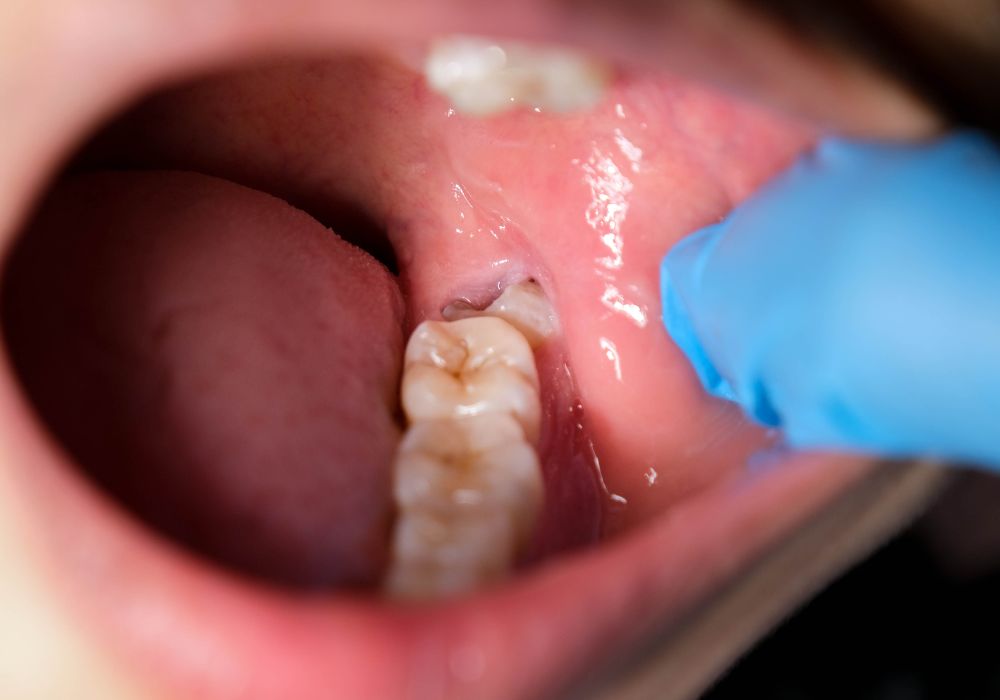
If you notice bleeding after wisdom tooth removal, try these first aid tips:
- Apply pressure: Firmly bite down on gauze pads or a clean tea bag placed directly on the bleeding socket. Apply continuous pressure for 30-60 minutes without peeping.
- Use cold compression: Wrap an ice pack or frozen vegetable bag in a towel and apply to the cheek near the extraction site. The cold constricts blood vessels and reduces blood flow.
- Avoid rinsing: Avoid forceful spitting or rinsing which can dislodge the clot. Gently wipe any blood pooling in your mouth.
- Bite down on black tea bags: The tannins in black tea help promote clotting. Soak a bag in water and use it instead of gauze for compression.
- Sleep upright: Sleep propped up on a few pillows to minimize throbbing and bleeding overnight after surgery. Keep your head elevated above heart level.
- Avoid smoking, straws, alcohol: Prevent dislodging the blood clot by avoiding any sucking motions and tobacco for at least 48 hours after extraction.
When should you call the dentist about wisdom tooth bleeding?
Contact your oral surgeon right away if:
- Bleeding continues beyond 24 hours after tooth extraction
- You’re soaking multiple gauze pads within an hour
- Bleeding is heavy and constant
- You see large blood clots coming from the socket
- You feel very weak or faint due to blood loss
You should also call your dentist if you have bad breath, severe pain, swollen gums, or fever as these are signs of infection. Heavy wisdom tooth bleeding paired with nausea or headaches can indicate a blood clot dislodged and entered the bloodstream.
Seek emergency care if bleeding is uncontrollable, you cough up blood, or have difficulty breathing.
Will wisdom tooth bleeding stop on its own?
For the first 24 hours after surgery, the bleeding is likely to stop and start occasionally. As long as it slows down to an ooze within 15 minutes of applying pressure, it should resolve on its own.
However, if the extraction socket continues to bleed heavily even after a day, it indicates a problem like infection or a bleeding disorder. You’ll need professional treatment to stop bleeding and prevent complications.
How can your dentist stop prolonged wisdom tooth bleeding?
If wisdom tooth bleeding persists beyond one day or seems excessive, your dentist has a few options:
- Stitching: The oral surgeon may re-suture the gum tissue over the extraction site for added stability and to close the wound.
- Medicated dressing: Packing the socket with antibacterial medicated gauze or collagen sponges can promote clotting. These dressings help stabilize the blood clot.
- Cauterization: Your dentist can cauterize the tissue using silver nitrate sticks or electrical cautery to seal bleeding vessels. However, this is rarely required.
- Clot stabilizing agents: Topical clotting agents or collagen plugs help stabilize clots over the wound. HemCon dental dressings contain chitosan which sticks to bleeding tissues.
- Blood coagulation tests: Persistent bleeding may warrant blood tests to check for an underlying bleeding disorder or issues with platelet count or function.
Are blood clots normal after wisdom tooth removal?
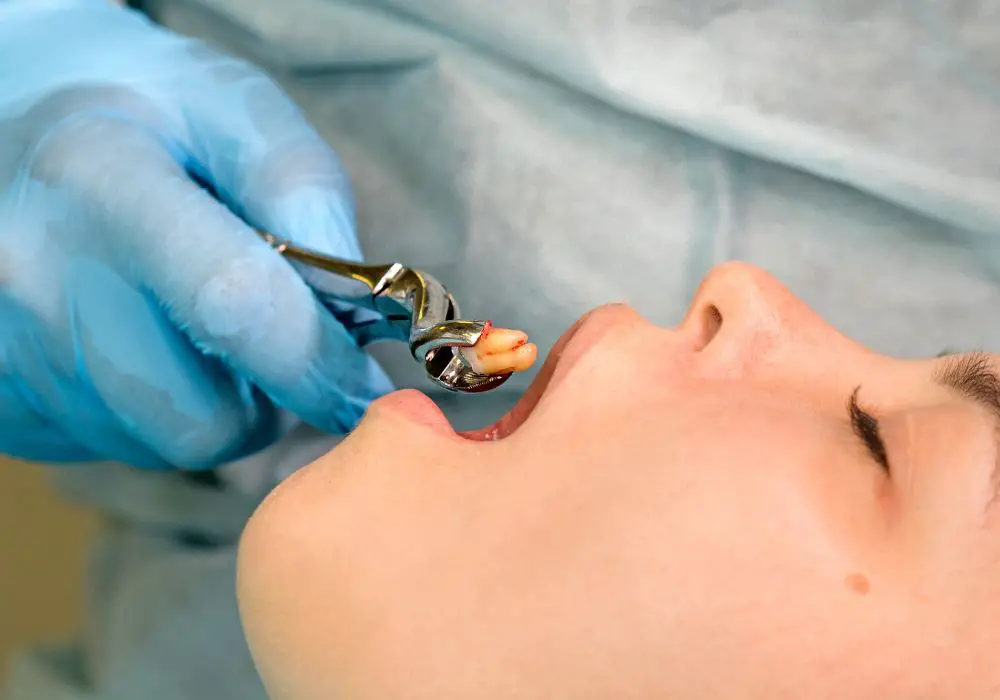
Passing small blood clots from the extraction site in the first 24 hours is common. As fresh blood oozes from the wound, it can form grain-sized clots that get dislodged with talking or rinsing.
However, if the clots are:
- Larger than a pea
- Very dark brown or purple
- Come out days after the surgery
This suggests heavy bleeding and requires prompt dental attention. Large blood clots can completely dislodge the healing clot from the socket causing dry socket.
Tips to prevent wisdom tooth bleeding complications
To minimize bleeding risks after extraction, follow these tips:
- Avoid smoking and alcohol: Don’t drink through straws or smoke for at least 2 days after surgery, as the suction motion can dislodge the clot and loosen stitches.
- Use ice packs: Applying cold compresses minimizes swelling and bleeding by constricting blood vessels.
- Bite on gauze: Maintain firm pressure by biting down on folded gauze or tea bags placed directly on the surgery site.
- Don’t disturb the wound: Avoid poking around or rinsing forcefully in the area where your wisdom teeth were extracted.
- Adjust medication use: Consult your dentist before surgery about safely adjusting doses of blood thinning medications like warfarin or NSAIDs around the extraction date.
- Eat soft foods: Stick to a liquid diet for the first 24 hours, then soft foods like yogurt, applesauce, eggs. Avoid very hot foods.
- Follow post-op instructions: Carefully follow your dentist’s directions about bleeding precautions, oral hygiene, activity restrictions, and medications.
When to seek emergency treatment for wisdom tooth bleeding?
In rare cases, severe bleeding after wisdom teeth removal requires emergency medical care. Go to the nearest ER immediately if you have:
- Bleeding that won’t stop after hours of direct pressure
- Feeling faint, fatigued, confused, or very weak due to blood loss
- Active bleeding along with trouble breathing or swallowing
- Vomiting blood or blood in phlegm after surgery
- Extreme facial swelling or pain, foul taste, fever indicating infection
Uncontrolled bleeding, swelling, and infection are rare but serious wisdom tooth extraction complications that need emergency evaluation. Left untreated, you may end up losing too much blood or develop sepsis.
Wisdom tooth bleeding FAQs
Here are some frequently asked questions about bleeding after wisdom teeth removal:
How long should wisdom tooth bleeding last?
It’s normal for wisdom teeth to bleed slightly for the first 24 hours after extraction. Heavy bleeding that lasts over a day likely indicates a problem like infection.
What should I do if the bleeding won’t stop?
Firmly bite on gauze or a moist tea bag placed directly on the extraction site for 30-60 minutes. If the bleeding continues past a day or seems excessive despite pressure, call your dentist for an emergency appointment.
Is blood normal when spitting or rinsing after wisdom tooth extraction?
Expect to see traces of blood in your saliva after surgery. However, if it’s steadily dripping blood instead of pink tinged saliva, avoid forceful rinsing and apply pressure instead.
How can I tell if I’m bleeding too much after wisdom tooth extraction?
Signs you’re losing too much blood include soaking through 2-3 gauze pads within 30 minutes, passing large red clots, or feeling dizzy and extremely weak due to blood loss.
Should I be concerned about throbbing pain at the surgery site?
It’s normal for wisdom tooth sites to throb and ache for a few days after extraction as the area heals. But significant swelling, severe pain, or bad taste or breath indicate complications like infection.
When can I resume normal activity after wisdom tooth extraction?
Avoid strenuous activity for at least 24 hours after surgery. Don’t play sports, exercise, or do anything where a blow to the face may dislodge the clot and cause bleeding for at least 2-3 days.
The bottom line
Bleeding after wisdom tooth removal generally stops within 24 hours with proper first aid and care. But if you can’t get the bleeding to stop after a day or notice signs of excessive blood loss like dizziness and fatigue, seek prompt dental treatment. With the right care, wisdom tooth bleeding should resolve quickly without complications.


